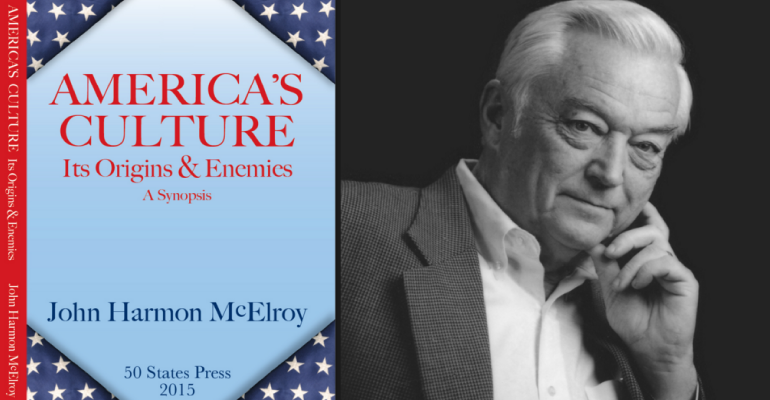
John Harmon McElroy’s book, America’s Culture, explores American exceptionalism. McElroy posits that American exceptionalism was announced to the world by our Declaration of Independence which says in part “that all men are created equal” which is different from the class-bound societies of Europe. Another important principle is that the people are the sovereign, not some king or dictator. At the time of America’s founding, these were radical ideas.
America’s Culture takes you on an interesting journey through American history from first settlement by European colonists to what McElroy believes is now the “paramount danger to America.” McElroy’s history is not so much a “who did what, when,” but rather why things happened as they did and how that shaped our culture.
McElroy shows the uniqueness of American culture by comparing it to the development of the other European colonial cultures of the New World: Canada, mainland Spanish America, and Brazil. Each colonial power encountered differences in physiography and climate, which influenced what they could do with the land; they encountered differences in the number and state of native people in the regions; and each colonial power had different philosophies about who should emigrate and how to treat native populations.
France, Spain, and Portugal tended to limit emigration to the New World by screening for fealty to crown and church. That tended to make the colonial populations homogeneous. England, however, did not screen emigrants, and allowed emigration from other parts of Europe. Instead they sought to build up a large colonial population that could send back agricultural products and be a market for English goods. That policy contributed to the diversity of American culture. McElroy writes: “The self-selecting immigrants who went to America wanted to be free of the socio-economic constraints inherent to societies based on birth-determined classes. They wanted to be self-determining. They were individualists who were willing to live among strangers and compete with them.” Also, these individualists found it to their own advantage to aid others and the community to make living better for all.
Chapter four recounts how our Constitution was formulated specifically to limit the federal government and preserve sovereignty for the people and the states. Chapter five deals with the diversity of religion in America and several Supreme Court decisions on the matter.
In chapter six, “The Paramount Danger to America,” McElroy discusses Political Correctness. He asserts that PC is influenced by Marxist philosophy and that PC “has taken over one of the major political parties and infiltrated the other and is exerting an increasing influence in the nation’s schools, churches, business enterprises, universities, media, government, and philanthropic institutions.” McElroy is, however, optimistic and says that the basic historical values of American culture will prevail.
I found this book to be very interesting and learned some things about the “why” of history and our culture that I had not appreciated before.
McElroy says that this book is for you if you can answer “yes” to any of the following questions:
- Are you grateful to be an American? Would you like to know why America is an exceptional country?
- Do you feel the basic values Americans have lived by are being degraded? Would you like to understand why and how this is happening?
- Is the federal government out of control in your opinion and taking from the States constitutional rights which belong to them?
- Do you think the U.S. debt needs to be curbed in fairness to future generations?
- Would you like to learn something new about America’s history and geography?
- Would you like to know why America is not doomed to decline?
America’s Culture is available in electronic form on Amazon Kindle and Barnes & Noble Nook. Print copies may be obtained from McElroy’s website: http://johnharmonmcelroy.com/ and from 50 States Press, 2100 E. Speedway Blvd., #43661, Tucson, AZ 85733.
About the author:
Professor Emeritus at the University of Arizona, John Harmon McElroy has chronicled Walt Whitman’s Civil War experiences and edited Washington Irving’s history of Columbus. His several books on American cultural history are Finding Freedom, American Beliefs, Divided We Stand, and his newly published America’s Culture Its Origins & Enemies, a synopsis of what has made American culture exceptional and the how and why of the present deliberate attempt by Political Correctness to transform that heritage.
Before going to the University of Arizona, Prof. McElroy taught at Clemson and the University of Wisconsin. As a Fulbright Professor of American Studies he has been a member of university faculties in Spain and Brazil. He has also lectured at universities in Poland and Colombia and presented papers at meetings of the American Studies associations of France and Argentina. The radio program on American history and culture he created, America’s Fabric, is broadcast on KVOI-AM, Tucson.
A graduate of Princeton University, he had two years of sea duty in the U. S. Navy, North Atlantic Fleet, before taking his PhD at Duke University. He and his wife Onyria Herrera Diaz, PhD, who writes bilingual medical dictionaries, were married in Cuba in 1957. They live in Tucson, Arizona, and have twelve children and grandchildren.
Other book reviews by Jonathan DuHamel:
Why Scientists Disagree About Global Warming by Craig D. Idso, Robert M. Carter, and S. Fred Singer
Sagebrush Rebel by William Perry Pendley
On Gaia, A Critical Investigation of the Relationship between Life and Earth by Toby Tyrrell
Doubt and Certainty in Climate Science by Alan Longhurst
Just the Fracks Ma’am Myths about hydrofracking by Greg Kozera – book review
